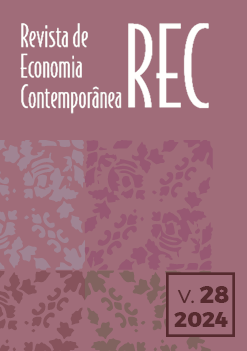Education-job mismatch in Brazil: incidence of over-education of labor or scarcity of qualified jobs
Keywords:
Labor market. Over-education. RAIS. Random effect.Abstract
The Brazilian labor market has significantly changed in recent decades, including an increase in workers with higher education. However, it shows an imbalance caused by overeducation, leading to inefficiency, decreased productivity, low wages, and dissatisfaction with mismatched jobs. This study aims to explain whether overeducation in Brazil is driven by labor supply or job demand factors. Using a microdata panel from the Annual List of Social Information (RAIS) for the period from 2010 to 2019, micro and macroeconomic variables were analyzed, and a random effects model with Newey-West robust standard errors was estimated, aggregated for the 27 Federative Units. Results indicate that overeducation stems from both the increase in workers with higher education and the slow growth in demand for qualified jobs. It is concluded that Brazil should adopt policies to improve worker qualifications and enhance the quality of education, creating economic conditions for the growth in demand for qualified jobs to be directly correlated with the supply of qualified workers, thus better allocating workers in the labor market.
Downloads
Published
Issue
Section
License
Copyright (c) 2024 Filipe Alrelio Gomes da Silva, Paulo Aguiar do Monte

This work is licensed under a Creative Commons Attribution 4.0 International License.
The Revista de Economia Contemporânea (Journal of Contemporary Economics) adopted the Creative Commons license attribution-type BY-NC until April/2015. The license attribution-type BY has been adopted ever since.
Ownership of copyrights belongs to the IE-UFRJ (Instituto de Economia da UFRJ), which will not pay copyrights for published works. In accordance with current copyright regulation and the type of copyright license adopted (CC-BY), article full or partial reproduction and release are allowed provided that the citation source is disclosed. In case this copyright rule is not obliged, a written warning will be issued by the publisher to the person who has disregarded this regulation.


